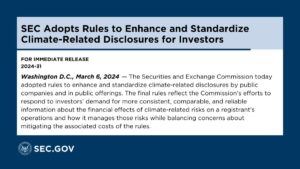Agri-Pulse's Steve Davies and Rebekah Alvey reported Monday that "Agriculture Secretary Brooke Rollins is renaming and changing the rules of a $3.1 billion program testing the ability of a variety…
Ag Avoids SEC Emissions Reporting Rule
Progressive Farmer’s Todd Neeley reported Wednesday that “the U.S. Securities and Exchange Commission on Wednesday voted to finalize a climate-disclosure rule that dropped a requirement for U.S.-listed companies to disclose Scope 3 greenhouse gas emissions, including farms and ranches.”
“The final rule is considered a victory for farmers and ranchers who spoke out against the ‘Enhancement and Standardization of Climate Related Disclosures for Investors rule,” Neeley reported.
What the Rule Does
The Financial Times’ Stefania Palma, Aime Williams and Patrick Temple-West reported that “the final rule could require thousands of companies to report some greenhouse gas emissions in a bid to provide investors with more consistent, reliable and comparable climate disclosures.”

“Under the final rule, about 40 percent of the 7,000 US public companies registered with the SEC would be large enough to qualify for mandatory scope 1 and 2 emissions reporting if their emissions were considered material,” Palma, Williams and Temple-West reported. “Roughly 60 percent of the 900 foreign private issuers registered with the SEC may also be subject to the new disclosures, if emissions meet the criteria.”
“Under the rules put in place today, large public companies will still have to report direct emissions from their operations and energy use that are “material” or essential for investors’ understanding of a company’s financial situation,” The Verge’s Justine Calma reported Wednesday. “Those disclosures would begin for fiscal year 2026.”
Why Scope 3 Emission Were Dropped
Neeley reported that “when the rule was proposed in April 2022, a group of more than 100 agriculture interest groups expressed concern that the rule could have required farms and ranches to report personal and business-related information to the SEC.”
“The agency said it had received a large number of comments that raised concerns around compliance costs of scope 3 reporting and whether current means of data collection could provide consistent and reliable disclosures,” Palma, Williams and Temple-West reported.
Bloomberg’s Lydia Beyoud and Zahra Hirji reported that “the proposal morphed into a political lightning rod on Capitol Hill once groups like the American Farm Bureau Federation complained that small food producers would be forced by their clients to measure and report their own emissions under the plan.”
Environmental Pushback
While environmental groups applauded the SEC for taking first steps by approving the climate-disclosure rule, “groups, including Friends of the Earth, said in response that the SEC’s commission’s 3-2 decision to leave agriculture and other industries out of the reporting rule was a mistake,” Neeley reported.
“The group said in a news release that Scope 3 emissions from upstream supply chains or downstream product consumption make up the vast majority of overall emissions for the food and agriculture sectors,” Neeley wrote. “‘For example, a recent analysis estimated that Scope 3 emissions from JBS (the world’s largest meat company) constitute 97% of the company’s emissions,’ FOE said in a news release. ‘This decision by SEC exposes investors to financial risk from incomplete information about a company’s climate-risk profile.'”
Potential For Legal Challenges
“It’s unclear whether the decision to scuttle Scope 3 in the final rule and other changes will be enough to stave off legal challenges from industry groups and attorneys general in more conservative-leaning states like West Virginia,” Palma, Williams and Temple-West reported. “On the flip side, the adjustments may lead to litigation from environmental activists, who wanted the SEC to take a more stringent approach.”





